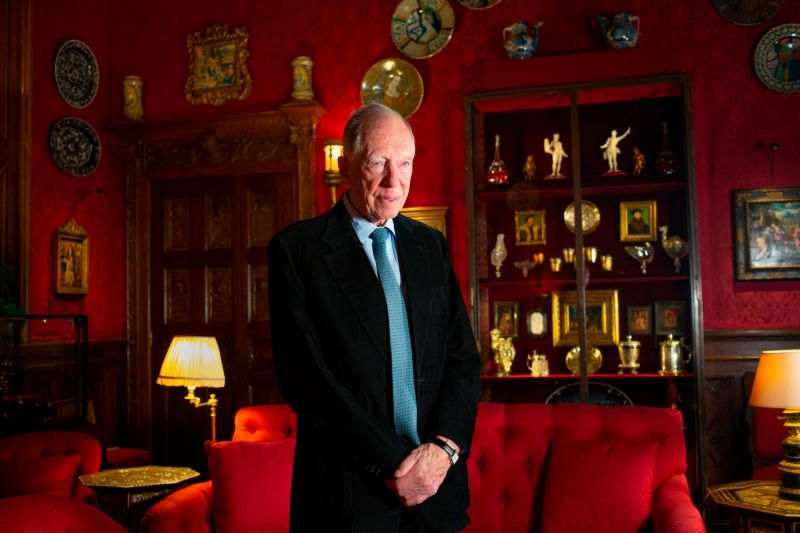A Legacy Of Wealth And Influence

The Rothschild family is synonymous with wealth, influence, and a storied legacy that stretches back over two centuries. The family's financial prowess has been a subject of fascination and speculation, leading many to ponder the true extent of their wealth. In this article, we will delve into the intricate details surrounding the Rothschild family net worth, exploring their investments, historical significance, and the factors that have contributed to their sustained economic power. Whether you are a history buff, a finance enthusiast, or simply curious about one of the world's most prominent families, this exploration promises to provide valuable insights.
Throughout history, the Rothschilds have been both celebrated and scrutinized for their financial acumen. Originating in the 18th century, Mayer Amschel Rothschild laid the groundwork for what would become one of the most influential banking dynasties in Europe. Today, the family's wealth is not just confined to banking; it spans various sectors, including real estate, agriculture, and even art. Understanding the dynamics of their wealth requires an examination of their historical context, investment strategies, and current holdings.
In this comprehensive article, we will analyze the Rothschild family net worth, breaking down their assets, investments, and the various factors influencing their financial standing. We will also discuss the family's philanthropic efforts and how they balance wealth with social responsibility. Join us as we uncover the layers of the Rothschild legacy and its impact on the global economy.
Table of Contents
1. History of the Rothschild Family
The Rothschild family's roots trace back to Frankfurt, Germany, where Mayer Amschel Rothschild established his banking business in the late 18th century. His innovative approach to finance and keen understanding of government bonds laid the foundation for a financial empire. Mayer Amschel had five sons, each of whom he strategically placed in major European cities: Frankfurt, London, Paris, Vienna, and Naples. This network allowed them to dominate international finance and accumulate vast wealth.
Over the years, the Rothschilds played a crucial role in financing major events, including the Napoleonic Wars, and became known for their expertise in managing government debt. Their influence expanded through marriages with other wealthy families, further solidifying their status in high society.
2. The Founder: Mayer Amschel Rothschild
Mayer Amschel Rothschild (1744-1812) is often regarded as the father of modern banking. Born into a modest family, he rose to prominence through his intelligence and strategic acumen. By the time of his death, he had established a banking dynasty that would endure for generations.
| Full Name | Mayer Amschel Rothschild |
|---|---|
| Date of Birth | February 23, 1744 |
| Date of Death | |
| Occupation | Banker, financier |
| Notable Contributions | Established a banking dynasty, financed wars, developed modern banking practices |
3. How Much is the Rothschild Family Net Worth?
Estimating the Rothschild family net worth is a complex task due to the diversity of their investments and the lack of publicly available financial disclosures. However, various estimates suggest that their collective wealth could range from $400 billion to $500 billion, making them one of the wealthiest families in the world. The family's wealth is not just a sum of money; it is embedded in various assets, including real estate, art collections, and agricultural enterprises.
4. Key Investments of the Rothschild Family
The Rothschild family's investments are extensive and varied. Here are some key areas where they have made significant contributions:
- Banking and Financial Services: The Rothschild Group operates in over 40 countries, providing a range of financial services, including investment banking and asset management.
- Real Estate: The family has substantial holdings in prime real estate across Europe and North America.
- Agriculture: Rothschilds own extensive vineyards and agricultural land, particularly in France.
- Art and Collectibles: The family's art collection is renowned, featuring works by masters such as Rembrandt and Van Gogh.
5. Philanthropic Efforts of the Rothschilds
Despite their immense wealth, the Rothschild family is also known for its philanthropic efforts. They have made significant contributions to various causes, including education, arts, and environmental sustainability. Some notable initiatives include:
- The Rothschild Foundation: Established to support charitable causes and promote social responsibility.
- Environmental Conservation: Investments in renewable energy and conservation projects.
- Educational Programs: Grants and scholarships to support education and academic research.
6. The Influence of the Rothschild Family
The Rothschild family's influence extends beyond finance. They have played pivotal roles in various historical events and have been involved in significant political discussions. Their connections with royalty, politicians, and influential figures have allowed them to shape economic policies and practices in Europe and beyond.
7. Current Status of Rothschild Wealth
As of 2023, the Rothschild family's wealth continues to thrive, bolstered by their diversified investments and global reach. They maintain a low profile, often avoiding public attention while strategically managing their assets. The family's commitment to philanthropy and social responsibility remains a core aspect of their legacy.
8. Conclusion and Future Prospects
In conclusion, the Rothschild family net worth is a testament to their historical significance, financial acumen, and influence. As we have explored, their wealth is rooted in a legacy of banking and finance, enriched by diverse investments and philanthropic efforts. The Rothschilds exemplify how generational wealth can be managed responsibly while contributing positively to society.
We invite you to share your thoughts on the Rothschild family or any insights you may have. Don't forget to leave a comment, share this article with others, or explore more content on our site for a deeper understanding of wealth and influence.
Thank you for reading, and we hope to see you back here for more engaging discussions on wealth, finance, and legacy.
ncG1vNJzZmivmaC2b7XSrJirrZKWe6S7zGiqsKGWqbCivtNtZqunpJ3ApLTIpZtmnpGitq3FjKecra%2Bfp8GpesetpKU%3D